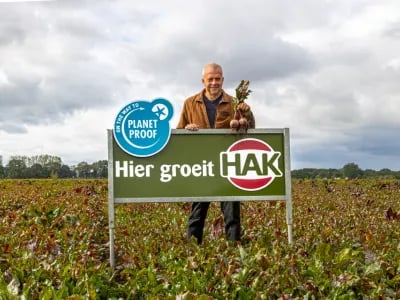Collaboration and extra remuneration for growers that work towards more sustainable and more resilient cultivation of vegetables
Canned vegetables manufacturer HAK is on schedule to have all summer and winter vegetables and legumes grown in the Netherlands ‘On the way to PlanetProof’ certified in 2021. This month, they will harvest the first certified kale and red beets from land in Brabant. HAK’s red cabbage (October 2019) and spinach (May 2020) already earned the ‘On the way to PlanetProof’ sustainability certificate.
Just like with the red cabbage and spinach, HAK now also compensates growers for the extra costs. For On the way to PlanetProof red beets and kale, HAK pays 7% and 14% more, respectively. Apart from this compensation for sustainably grown, certified crops, the collaboration with the contracted growers focuses, to an increasing extent, on the challenge of making, in this case, red beets and kale varieties more resistant against pests, drought, and excessive rain, for example, but in a way that’s natural. These challenges are quite topical when it comes to sustainable cultivation, where, as you’d expect, artificial means are not allowed.
Pieter Verschure, a grower from Aarle Rixtel, who has extensive experience with sustainable cultivation, but in the floriculture industry, explains the challenges: ‘Apart from the extra costs, our transition to On the way to PlanetProof certification for red beets and kale was no longer a major obstacle. After all, we’ve spent years trying to find the best way to fertilise the soil naturally. We source garden compost from the surrounding area, and this year, Staatsbosbeheer (the Dutch government organisation for Forestry) started supplying us with grass from the areas where they work to avoid biodiversity loss. They mow the grass and dispose of it to clear the brush and help nature develop. It’s a win-win situation. They give nature an extra helping hand, and we use this grass to enrich our soil. Also, we take leaf samples, instead of soil samples, which gives us a better idea of what nutrients the leafy vegetables need. We aim all our efforts at ensuring our crop’s vitality.’
Pieter Verschure is a member of De Schakel cooperation, and the members are very familiar with the raw materials that they already cultivate under the On the way to PlanetProof quality mark. For him, the drought of this past summer didn’t have significant negative consequences on how the red beet and kale grew. ‘The art is to water the vegetables when they need it, but not too much. The plant should not become lazy, but instead, should slowly develop a proper root system. If you water too much, the crop will experience growth spurts during a period of drought, resulting in a poor harvest. This, too, is part of making the red beet’s taproots or the kale plant’s root system more resilient. Of course, this process requires the necessary attention.’
Adri den Dekker, HAK’s Director of Purchasing, Agriculture & Sustainability, is overjoyed at the opportunity to work with the growers so openly. ‘Apart from improving the resilience, we’re also discussing new mechanical techniques. For example, pulling out or removing the weeds that grow amongst the crops, so we can avoid using pesticides. We also talk about which varieties are best-suited to our climate (which is subject to change) and which natural enemies we can introduce and use during the cultivation process. For example, ladybugs love munching on aphids.’
The public should get more involved in local cultivation | The HAK growers would love to see increased awareness of the vegetables grown locally and for On The way to PlanetProof. A perspective that links up seamlessly with the ‘Green Normal’ that HAK pleaded for in June and which, essentially, means to ‘eat more locally grown food, more plant-based food, and to reward growers for their efforts when cultivating sustainably’.
‘We, the growers, benefit when our public is closer to us. In the end, they should be the ones buying our products. There are many possibilities in the Netherlands, but people have no idea where their vegetables grow. And this makes them unaware of what they’re eating, how it was produced, and how healthy or unhealthy it is. In that respect, we still have a long way to go. In the Netherlands, we can grow a lot more than you’d think. We could cultivate a large share of the vegetables that come from afar, right here,’ says Pieter Verschure.
The On the way to PlanetProof certified kale in a HAK glass jar is already available in the stores. The first On the way to PlanetProof red beets will be available from mid-November.
Also read:
HAK supports higher payments for farmers who invest in sustainability



.jpg?width=448&height=200&name=cybersecurity-privacy-protect-data%20(1).jpg)









